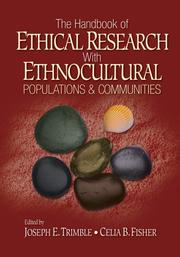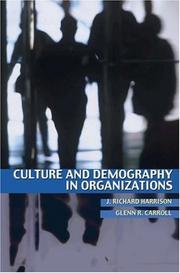| Listing 1 - 9 of 9 |
Sort by
|

ISBN: 1280619201 9786610619207 0387286624 0387286616 1441939490 Year: 2006 Publisher: New York, NY : Springer,
Abstract | Keywords | Export | Availability | Bookmark
 Loading...
Loading...Choose an application
- Reference Manager
- EndNote
- RefWorks (Direct export to RefWorks)
It was once assumed that the bedrock concepts of psychology held true for all the world’s peoples. More recently, post-modern approaches to research have expanded on these Western models, building a psychology that takes into account the sociopolitical, historical, religious, ecological, and other indigenous factors that make every culture, as well as every person as agents of their own actions. Indigenous and Cultural Psychology surveys psychological and behavioral phenomena in native context in various developing and developed countries, with particular focus on Asia. An international team of 28 experts clarifies culture-specific concepts (such as paternalism and the Japanese concept of amae), models integrative methods of study, and dispels typical misconceptions about the field and its goals. The results reflect culturally sound frames of reference while remaining rigorous, systematic, and verifiable. These approaches provide a basis for the discovery of true psychological universals. Among the topics featured: Scientific and philosophical bases of indigenous psychology Comparisons of indigenous, cultural, and cross-cultural psychologies Socialization, parent-child relationship, and family The private and public self: concepts from East Asia, Europe, and the Americas Interpersonal relationships: concepts from East Asia, Europe,, and the U.S. Factors promoting educational achievement and organizational effectiveness in Asia The growth and indigenization of psychology in developing and developed countries Are any values, attitudes, beliefs and traits universal? Cross-national comparisons The potential for indigenous psychology to lead to a global psychology With this book, the editors have captured a growing field at a crucial stage in its evolution. Indigenous and Cultural Psychology benefits students and researchers on two levels, offering groundbreaking findings on understudied concepts, and signaling future directions in universal knowledge.
Ethnopsychology. --- National characteristics. --- Characteristics, National --- Identity, National --- Images, National --- National identity --- National images --- National psychology --- Psychology, National --- Anthropology --- Nationalism --- Social psychology --- Collective memory --- Ethnopsychology --- Exceptionalism --- Cross-cultural psychology --- Ethnic groups --- Ethnic psychology --- Folk-psychology --- Indigenous peoples --- Psychological anthropology --- Psychology, Cross-cultural --- Psychology, Ethnic --- Psychology, Racial --- Race psychology --- Psychology --- National characteristics --- Applied psychology. --- Psychology, clinical. --- Cross Cultural Psychology. --- Clinical Psychology. --- Clinical psychology. --- Applied psychology --- Psychagogy --- Psychology, Practical --- Social psychotechnics --- Psychiatry --- Psychology, Applied --- Psychological tests --- Cross-cultural psychology.

ISBN: 9780521822978 0521822971 9780521529877 0521529875 9780511489822 1107159741 1280567821 0511241542 0511240503 0511318170 051148982X 051124102X 9780511242106 0511242107 9780511241543 051123953X 9780511239533 9780511240508 9780511241024 9781280567827 9786610567829 6610567824 Year: 2006 Publisher: Cambridge, UK ; New York : Cambridge University Press,
Abstract | Keywords | Export | Availability | Bookmark
 Loading...
Loading...Choose an application
- Reference Manager
- EndNote
- RefWorks (Direct export to RefWorks)
Contemporary trends such as increased one-parent families, high divorce rates, second marriages and homosexual partnerships have all contributed to variations in the traditional family structure. But to what degree has the function of the family changed and how have these changes affected family roles in cultures throughout the world? This book attempts to answer these questions through a psychological study of families in thirty nations, carefully selected to present a diverse cultural mix. The study utilises both cross-cultural and indigenous perspectives to analyse variables including family networks, family roles, emotional bonds, personality traits, self-construal, and 'family portraits' in which the authors address common core themes of the family as they apply to their native countries. From the introductory history of the study of the family to the concluding indigenous psychological analysis of the family, this book is a source for students and researchers in psychology, sociology and anthropology.
Family --- -316.356.2 --- Families --- Family life --- Family relationships --- Family structure --- Relationships, Family --- Structure, Family --- Social institutions --- Birth order --- Domestic relations --- Home --- Households --- Kinship --- Marriage --- Matriarchy --- Parenthood --- Patriarchy --- Psychological aspects --- Gezinssociologie --- Social aspects --- Social conditions --- 316.356.2 Gezinssociologie --- Ethnopsychology --- 316.356.2 --- Cross-cultural psychology --- Ethnic groups --- Ethnic psychology --- Folk-psychology --- Indigenous peoples --- National psychology --- Psychological anthropology --- Psychology, Cross-cultural --- Psychology, Ethnic --- Psychology, National --- Psychology, Racial --- Race psychology --- Psychology --- National characteristics --- Ethnopsychology. --- Health Sciences --- Psychiatry & Psychology

ISBN: 9780521614061 9780521849241 0521614066 0521849241 9780511489891 1316086283 1280550392 9786610550395 0511225660 0511489897 0511224362 0511318006 0511225032 9780511226236 0511226233 0511223021 9780511223020 9780511225031 9781280550393 9780511225666 6610550395 9781316086285 9780511224362 9780511318009 1316450384 Year: 2006 Publisher: Cambridge : Cambridge University Press,
Abstract | Keywords | Export | Availability | Bookmark
 Loading...
Loading...Choose an application
- Reference Manager
- EndNote
- RefWorks (Direct export to RefWorks)
In recent years the topic of acculturation has evolved from a relatively minor research area to one of the most researched subjects in the field of cross-cultural psychology. This edited handbook compiles and systemizes the current state of the art by exploring the broad international scope of acculturation. A collection of the world's leading experts in the field review the various contexts for acculturation, the central theories, the groups and individuals undergoing acculturation (immigrants, refugees, indigenous people, expatriates, students and tourists) and discuss how current knowledge can be applied to make both the process and its outcome more manageable and profitable. Building on the theoretical and methodological framework of cross-cultural psychology, the authors focus specifically on the issues that arise when people from one culture move to another culture and the reciprocal adjustments, tensions and benefits involved.
Acculturation. --- Ethnopsychology. --- Adaptation, Psychological. --- Cross-Cultural Comparison. --- Ethnic Groups --- Acculturation --- Ethnopsychologie --- Acculturatie. --- Cross-culturele psychologie. --- psychology. --- Ethnopsychology --- Cross-cultural psychology --- Ethnic groups --- Ethnic psychology --- Folk-psychology --- Indigenous peoples --- National psychology --- Psychological anthropology --- Psychology, Cross-cultural --- Psychology, Ethnic --- Psychology, National --- Psychology, Racial --- Race psychology --- Psychology --- National characteristics --- Culture contact --- Development education --- Civilization --- Culture --- Ethnology --- Assimilation (Sociology) --- Cultural fusion --- Ethnicity --- Culture contact (Acculturation) --- Health Sciences --- Psychiatry & Psychology

ISBN: 1452265569 1412952662 1849725640 1412939623 9781412939621 9781412952668 9781452265568 1412909481 9781412909488 Year: 2006 Publisher: Thousand Oaks, Calif.
Abstract | Keywords | Export | Availability | Bookmark
 Loading...
Loading...Choose an application
- Reference Manager
- EndNote
- RefWorks (Direct export to RefWorks)
This volume presents a thorough overview of the psychology of racial, ethnic and minority issues and covers the breadth of pscyhology viewed through the lens of the racial and ethnic minority experience.
Ethnopsychology --- Minorities --- Ethnic minorities --- Foreign population --- Minority groups --- Persons --- Assimilation (Sociology) --- Discrimination --- Ethnic relations --- Majorities --- Plebiscite --- Race relations --- Segregation --- Cross-cultural psychology --- Ethnic groups --- Ethnic psychology --- Folk-psychology --- Indigenous peoples --- National psychology --- Psychological anthropology --- Psychology, Cross-cultural --- Psychology, Ethnic --- Psychology, National --- Psychology, Racial --- Race psychology --- Psychology --- National characteristics --- Ethnic identities --- Ethnic nations (Ethnic groups) --- Groups, Ethnic --- Kindred groups (Ethnic groups) --- Nationalities (Ethnic groups) --- Peoples (Ethnic groups) --- Ethnology
Book
ISBN: 1281067598 9786611067595 0387262385 Year: 2006 Publisher: New York ; London : Springer,
Abstract | Keywords | Export | Availability | Bookmark
 Loading...
Loading...Choose an application
- Reference Manager
- EndNote
- RefWorks (Direct export to RefWorks)
Has the developing world developed modern concepts of stress? Are coping methods the same around the globe? Such questions are not simple to answer, and until recently, few knew to ask them. In recent years, Western psychologists have recognized that their prevailing views of psychology do not always translate worldwide—and that no culture has a monopoly on either stress or coping. The Handbook of Multicultural Perspectives on Stress and Coping was created to address this realization. This unique volume moves beyond simple comparisons of behaviors in other countries by clarifying critical concepts in stress and coping, analyzing and synthesizing vast amounts of global data, and identifying constructs and methodologies necessary for meaningful cross-cultural research. An international, multiethnic panel of forty-five contributors presents elegant studies of stress, survival, and resilience as cultures evolve and countries interact, including: • Personal transformation as a coping strategy • Psychological skills that enhance intercultural adjustment • Individual versus collectivist values in coping • Buddhist and Taoist traditions in coping • The cumulative effects of historical, environmental, and political stressors on nations in the Middle East • Specific cross-cultural perspectives, from Latino-American families to Canadian aboriginal peoples to minority university students The editors have assembled a vital store of knowledge, raising crucial implications for clinicians working with immigrant/international populations, and evaluating the current state of theory, research, and assessment. The Handbook documents major steps toward scientific advancement—and human understanding.
Stress management --- Ethnopsychology. --- Adjustment (Psychology) --- Personality and culture --- Civilization and personality --- Culture and personality --- Civilization --- Culture --- Ethnopsychology --- Accommodation (Psychology) --- Adaptation (Psychology) --- Adapting behavior --- Adaptive behavior --- Coping behavior --- Maladjustment (Psychology) --- Personality --- Psychology --- Adaptability (Psychology) --- Cross-cultural psychology --- Ethnic groups --- Ethnic psychology --- Folk-psychology --- Indigenous peoples --- National psychology --- Psychological anthropology --- Psychology, Cross-cultural --- Psychology, Ethnic --- Psychology, National --- Psychology, Racial --- Race psychology --- National characteristics --- Management, Stress --- Health --- Applied psychology. --- Psychology, clinical. --- Cross Cultural Psychology. --- Psychotherapy and Counseling. --- Clinical Psychology. --- Clinical psychology. --- Applied psychology --- Psychagogy --- Psychology, Practical --- Social psychotechnics --- Psychiatry --- Psychology, Applied --- Psychological tests

ISBN: 128062390X 9786610623907 0387277714 038727765X 0387277706 Year: 2006 Publisher: New York, NY : Springer,
Abstract | Keywords | Export | Availability | Bookmark
 Loading...
Loading...Choose an application
- Reference Manager
- EndNote
- RefWorks (Direct export to RefWorks)
As America’s classrooms become more demographically diverse, educators must learn how to respond to the different needs and cultural styles of children who represent such diversity. Diversity Training for Classroom Teaching is a resource guide geared to help educators create classroom communities that respond to diversity. The learning activities presented in this volume define terminology, provide activities to raise self-awareness, include newspaper articles that illustrate the relevance of concepts, and allow for an overall dialogue about diverse issues. This book encourages readers to generate their own construction of effective multicultural education and learn how to adapt it across various student populations and educational problems. At the same time, learning activities encourage readers to respect and seek to understand the experiences and worldviews of different people and how these diverse realities influence what is meant by multicultural education. "An incredibly practical, down to earth approach to dealing with potentially difficult material. Based on current, scholarly work, this book gives teachers real-world help for our increasingly diverse schools. The additional resources listed at the end of each chapter provide a window into the astonishing array of additional scholarly and useful materials." Patricia M. Raskin, Ph.D., Associate Professor of Organization and Leadership, Teachers College, Columbia University "It is a terrific book that provides clear and necessary guidance that helps teachers and students explore issues of diversity in a profound and yet simple and engaging manner. It is a must for those interested in learning how best to address the complexity of this issue in ways that are likely to yield results." Rafael Art. Javier, Ph.D., Professor and Director of Community Outreach Initiatives and Special Programs, St. John’s University "Diversity Training for Classroom Teaching, by Caroline Clauss-Ehlers is a well constructed comprehensive guide through the maze of "cultural competence," racism, and many other aspects of diversity in our society. The book is easy to use with many clear and well thought out exercises that will be valuable to both the teachers and their students. Additional web notes, references, and bibliographies for every chapter enhance the book so it is both a text and a training manual." Paul Jay Fink, M.D., Former American Psychiatric Association President.
Multicultural education --- Teachers --- Training of --- Faculty (Education) --- Instructors --- School teachers --- Schoolteachers --- School employees --- Intercultural education --- Education --- Culturally relevant pedagogy --- Applied psychology. --- Psychology, clinical. --- Teaching and Teacher Education. --- Cross Cultural Psychology. --- Clinical Psychology. --- Clinical psychology. --- Applied psychology --- Psychagogy --- Psychology, Practical --- Social psychotechnics --- Psychology --- Psychiatry --- Psychology, Applied --- Psychological tests --- Teaching. --- Cross-cultural psychology. --- Cross-cultural psychology --- Ethnic groups --- Ethnic psychology --- Folk-psychology --- Indigenous peoples --- National psychology --- Psychological anthropology --- Psychology, Cross-cultural --- Psychology, Ethnic --- Psychology, National --- Psychology, Racial --- Race psychology --- National characteristics --- Didactics --- Instruction --- Pedagogy --- School teaching --- Schoolteaching --- Instructional systems --- Pedagogical content knowledge --- Training

ISBN: 0761930434 1322283648 1412986168 1483303543 1483365867 Year: 2006 Publisher: Thousand Oaks, CA : Sage Publications,
Abstract | Keywords | Export | Availability | Bookmark
 Loading...
Loading...Choose an application
- Reference Manager
- EndNote
- RefWorks (Direct export to RefWorks)
This volume addresses challenges at methodological, procedural and conceptual levels for the responsible conduct of research in the field. Each chapter includes case examples to illustrate significant ethical principles.
Ethnology --- Ethnopsychology --- Anthropological ethics --- Anthropologie sociale et culturelle --- Ethnopsychologie --- Anthropologues --- Methodology --- Handbooks, manuals, etc. --- Méthodologie --- Déontologie --- Guides, manuels, etc. --- Ethnic groups --- Research --- Méthodologie --- Déontologie --- Anthropologists --- Anthropology --- Professional ethics --- Ethnic identities --- Ethnic nations (Ethnic groups) --- Groups, Ethnic --- Kindred groups (Ethnic groups) --- Nationalities (Ethnic groups) --- Peoples (Ethnic groups) --- Cross-cultural psychology --- Ethnic psychology --- Folk-psychology --- Indigenous peoples --- National psychology --- Psychological anthropology --- Psychology, Cross-cultural --- Psychology, Ethnic --- Psychology, National --- Psychology, Racial --- Race psychology --- Psychology --- National characteristics --- Cultural anthropology --- Ethnography --- Races of man --- Social anthropology --- Human beings --- Moral and ethical aspects --- Anthropological ethics. --- Research.
Book
ISBN: 1280947063 9786610947065 0813539978 9780813539973 0813538645 9780813538648 0813538653 9780813538655 Year: 2006 Publisher: New Brunswick, N.J. : Rutgers University Press,
Abstract | Keywords | Export | Availability | Bookmark
 Loading...
Loading...Choose an application
- Reference Manager
- EndNote
- RefWorks (Direct export to RefWorks)
The Native American casino and gaming industry has attracted unprecedented American public attention to life on reservations. Other tribal public venues, such as museums and powwows, have also gained in popularity among non-Native audiences and become sites of education and performance. In Public Native America, Mary Lawlor explores the process of tribal self-definition that the communities in her study make available to off-reservation audiences. Focusing on architectural and interior designs as well as performance styles, she reveals how a complex and often surprising cultural dynamic is cre
Indians of North America --- Ethnopsychology --- Self-perception --- Indians in popular culture --- Powwows --- Museum exhibits --- Gambling on Indian reservations --- Public opinion --- Indian gaming --- Indian reservations --- Display techniques --- Displays, Museum --- Museum displays --- Museums --- Exhibitions --- Museum techniques --- Pow wows --- Festivals --- Popular culture --- Self-concept --- Self image --- Self-understanding --- Perception --- Self-discrepancy theory --- Self-evaluation --- Cross-cultural psychology --- Ethnic groups --- Ethnic psychology --- Folk-psychology --- Indigenous peoples --- National psychology --- Psychological anthropology --- Psychology, Cross-cultural --- Psychology, Ethnic --- Psychology, National --- Psychology, Racial --- Race psychology --- Psychology --- National characteristics --- Public opinion. --- Psychology. --- Ethnic identity. --- Rites and ceremonies --- Race identity

ISBN: 0691124825 9780691124827 0691124817 9780691124810 Year: 2006 Publisher: Princeton, New Jersey ; Oxford : Princeton University Press,
Abstract | Keywords | Export | Availability | Bookmark
 Loading...
Loading...Choose an application
- Reference Manager
- EndNote
- RefWorks (Direct export to RefWorks)
How do corporations and other organizations maintain and transmit their cultures over time? Culture and Demography in Organizations offers the most reliable and comprehensive answer to this complex question to date. The first book on the subject to ground its analysis in mathematical tools and computer simulation, it goes beyond standard approaches, which focus on socialization within organizations, by explicitly considering the effects of demographic processes of entry, exit, and organizational growth. J. Richard Harrison and Glenn R. Carroll base their analysis on a formal model with three components: hiring, socialization, and employee turnover. In exploring the model's implications through computer simulation methods, the authors cover topics such as organizational growth and decline, top management teams, organizational influence networks, terrorist organizations, cultural integration following mergers, and organizational failure. For each topic, they identify the conditions influencing cultural transmission. In general, they find that demographic processes play a central role in influencing organizational culture and that studying these processes leads to some surprising insights unavailable when considering socialization alone. This book, which also serves as an ideal introduction to the increasingly popular use of computer simulation, will be an indispensable resource for scholars and students of organization theory and behavior, cultural studies, strategic management, sociology, economics, and social simulation.
Organization theory --- Corporate culture. --- Employees --- Labor turnover. --- Organizational change. --- Social sciences --- Strategic planning. --- Recruiting. --- Computer simulation. --- Corporate culture --- Labor turnover --- Organizational change --- Strategic planning --- Goal setting (Strategic planning) --- Planning, Strategic --- Strategic intent (Strategic planning) --- Strategic management --- Planning --- Business planning --- Behavioral sciences --- Human sciences --- Sciences, Social --- Social science --- Social studies --- Civilization --- Change, Organizational --- Organization development --- Organizational development --- Organizational innovation --- Management --- Organization --- Manpower planning --- Employee turnover --- Turnover of labor --- Personnel management --- Labor mobility --- Recruiting of employees --- Recruitment of employees --- Employment agencies --- Culture, Corporate --- Institutional culture --- Organizational culture --- Corporations --- Organizational behavior --- Business anthropology --- Recruiting --- Computer simulation --- Sociological aspects --- SOCIAL SCIENCE / Sociology / General. --- Demografische aspecten. --- Bedrijfscultuur. --- Organisationskultur --- Unternehmenskultur --- 85.08 organizational sociology and psychology. --- Sciences sociales --- Personnel --- Foires à l'emploi. --- Planification strategique. --- Changement organisationnel. --- Culture d'entreprise. --- Laborers --- Workers --- Persons --- Industrial relations --- Simulation par ordinateur. --- Rotation. --- Cypress Semiconductor. --- Gibrat's law. --- Grooves. --- Hewlett-Packard. --- Japanese-style organizational type Jesuits. --- New Guinea. --- Q-sort technique. --- Southwest Airlines. --- Texas Instruments. --- Weather Underground. --- Z-type organizational type. --- assumptions of model. --- autocratic model. --- board of directors. --- bureaucratic organizational type. --- cellular structure. --- cultural analysis. --- decomposition of tenure distribution. --- design. --- dimensions of culture. --- disruption effect. --- entrepreneurial organization. --- epidemiology of representations. --- ethnography. --- explanation. --- fraternities. --- heterogeneity. --- homogeneity. --- influence network. --- liability of newness. --- measurement of culture. --- mortality. --- multidimensionality in culture. --- peer influence. --- psychological anthropology. --- recruitment. --- sensitivity analysis. --- socialization. --- star model. --- stochastic rate tekonymy. --- strong culture. --- structural holes. --- subcultures. --- tenure. --- terrorist organizations. --- tractability of model. --- turnover. --- underground organizations. --- utility concept. --- values. --- variance in enculturation.
| Listing 1 - 9 of 9 |
Sort by
|

 Search
Search Feedback
Feedback About
About Help
Help News
News